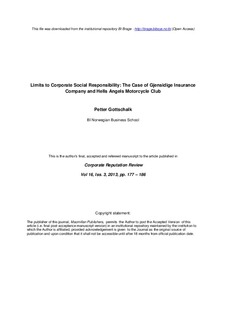| dc.contributor.author | Gottschalk, Petter | |
| dc.date.accessioned | 2013-08-08T14:36:45Z | |
| dc.date.issued | 2013 | |
| dc.identifier.issn | 1479-1889 | |
| dc.identifier.uri | http://hdl.handle.net/11250/93926 | |
| dc.description | This is the author's final and accepted version of the article, post refereeing. Publisher's version is available at www.palgrave-journals.com | no_NO |
| dc.description.abstract | The purpose of this paper is to explore the limits to corporate social responsibility by presenting and discussing the case of Gjensidige Insurance Company and its efforts to contribute to organized crime prevention. Based on a stage model for corporate social responsibility, this paper argues that the Gjensidige case might be found at the most advanced maturity level, which is the contribution stage of proactive involvement in society. At this final maturity level, corporate executives as well as all other organizational members perceive their business as part of a greater course in society. They take on a comprehensive and active responsibility in the local as well as global society, and they look for opportunities in society where the company can make a difference. | no_NO |
| dc.language.iso | eng | no_NO |
| dc.publisher | Macmillan Publishers | no_NO |
| dc.subject | case study | no_NO |
| dc.subject | corporate responsibility | no_NO |
| dc.subject | organized crime | no_NO |
| dc.subject | stage model | no_NO |
| dc.title | Limits to Corporate Social Responsibility: The Case of Gjensidige Insurance Company and Hells Angels Motorcycle Club | no_NO |
| dc.type | Journal article | no_NO |
| dc.type | Peer reviewed | no_NO |
| dc.description.embargo | 2015-01-15 | |
| dc.source.pagenumber | 177-186 | no_NO |
| dc.source.volume | 16 | no_NO |
| dc.source.journal | Corporate Reputation Review | no_NO |
| dc.source.issue | 3 | no_NO |
